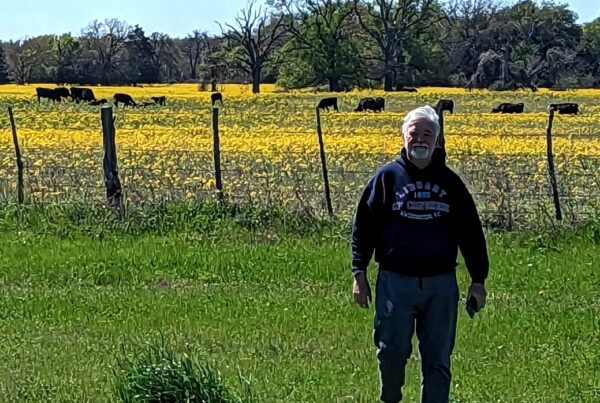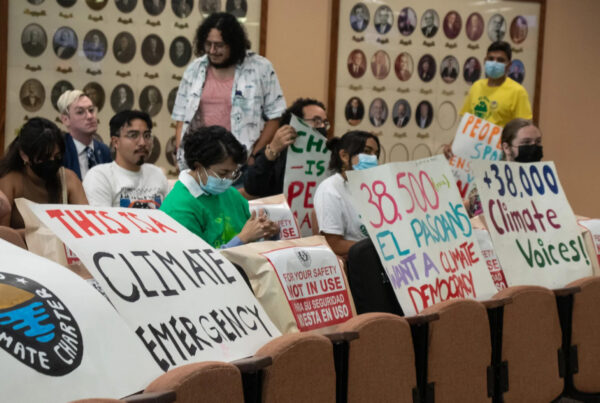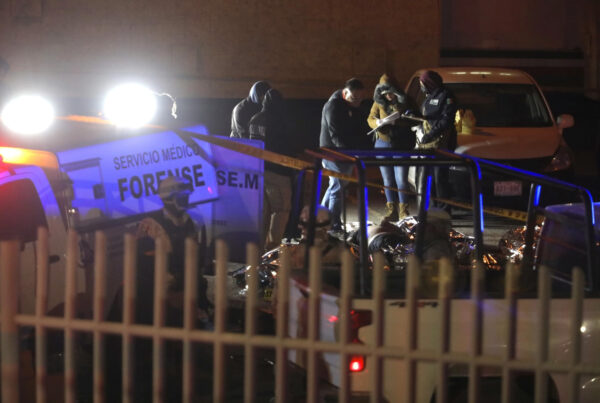From KUT:
Maria Pérez heard she was weeks away from homelessness from an unlikely source. It wasn’t a case manager or anyone from the administrative staff at the Salvation Army downtown shelter, where she’s been staying for weeks.
“I heard it from the lady that cleans,” she told KUT.
Pérez had been struggling to hold down an apartment, so she got a room at the shelter, which has about 100 beds. In February, management announced they were shutting down the site, and that Pérez and other residents had until March 15 to leave.
The shelter has served primarily single women — one of the most vulnerable populations in Austin’s homeless community — for decades. The announcement that it was closing so quickly came as a shock to many. It will leave a huge gap in services in the downtown area.

Maria Pérez, a resident at the Salvation Army’s downtown shelter, says she hasn’t received any help finding a place to stay.
Patricia Lim / KUT
Pérez, who’s lived in Austin since 2001, was given an option: a bus ticket to Dallas, where the Salvation Army has another shelter.
“This is my hometown. I like it here,” she said. “I don’t wanna go up to Dallas.”
Pérez is one of dozens of residents who successfully spoke out against the speed of the closure, getting it pushed back. The city agreed to pay up to $100,000 to keep it open until the end of April.
Pérez has been looking for a place of her own. She says Salvation Army case managers haven’t offered a lot of help, and she’s even heard of people being “harassed” to leave ahead of the closure.
“I’ve heard that multiple times,” said Libby Brennan, a case manager at Trinity Center, a day center where folks can get food, IDs, bus passes — anything to help transition out of homelessness.
“We have been feeling the ripple effects of how this treatment — or mistreatment — of our neighbors is affecting them,” she said. “One of my clients believes that they’re using these tactics because they spoke out against Salvation Army.”
A spokesperson for the Texas Harm Reduction Alliance, which helped organize protests of the closure, also told KUT several participants said they felt their choice to speak out had impacted their case-management services.
KUT reached out to Salvation Army about the allegations, but did not hear back.
‘Trying to survive’
The city has said it’s working with shelter residents to find housing. Some of that work means getting people into hotels, at least temporarily.
Courtney Santana has been doing that work for more than a decade. Her nonprofit, Survive 2 Thrive, finds vacant hotel rooms and gives temporary shelter to people fleeing domestic and family violence.
Santana said she’d heard talk of the shelter closure for years, so she doesn’t understand why the city was caught flat-footed.
“They knew this was coming, so why didn’t they plan for it?” she said. “Shelters don’t just close like that unless there’s a fire or there’s some sort of risk, like COVID. … The reasoning they’re giving behind the closure is not acceptable to me.”
Santana said the closure could create more demand for providers like her. According to the Ending Community Homeless Commission, a third of people experiencing homelessness in Austin last year were domestic violence survivors. Another survey from 2019 found as many as 70% of people attributed their homelessness to some sort of trauma or abuse.
“They’re not gonna be able to place all those people,” Santana said. “We try. All the time.”
Currently, there are fewer than 1,000 emergency shelter beds for people experiencing homelessness in Austin. The closure of the Salvation Army shelter means there will no longer be a dedicated space for single women downtown.
The Salvation Army has said it’s dead-set on selling the property. It’ll likely fetch millions.
Brennan said she hopes the organization will reconsider.
“Considering that this is the only shelter where women have a safeguard from the streets,” she said, “this essentially creates so many more problems for these women trying to survive.”
The SAFE Alliance, which helps provide shelter for people fleeing domestic violence, said it has received more calls for assistance since the closure was announced.
Erin Clark, senior director for the nonprofit’s help line, said there are fewer resources available to single women.
“Of everyone on our waitlist for shelter, single women are experiencing homelessness at rates higher than that of families,” Clark said in an email. “Also, they represent more of the clients that report sleeping outside or in their vehicles, and experiencing additional violence (physical and sexual assault) while homeless.”
Pérez still doesn’t know where she’ll go after she leaves the Salvation Army shelter. She said she had lined up an apartment on her own and submitted an application, but the landlord turned her down. So she’s back to square one, looking for an apartment while balancing work and the stress of the shelter’s closure.
“[I] love this city, but it is getting too unaffordable,” she said. “That’s why I think there’s so many people that end up being homeless because the cost of living is so high.”















